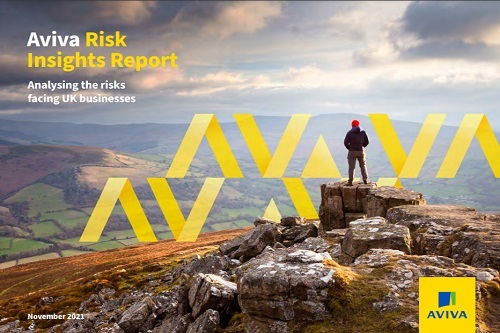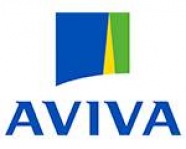Aviva Risk Insights Report - Analysing the risks facing UK businesses

Authored by Aviva
The economy, worker shortages, Brexit, Covid and reputational damage – the biggest risks to UK businesses.
Aviva’s second risk report captures views of 1,251 business leaders from small, medium and large UK businesses across nine industry sectors and outlines key risks for the year ahead.
- Economic concerns (37%) tops table of risks facing British businesses
- Firms are nearly twice as confident about their own economic prospects (61%) than the UK’s (34%)
- A shortage of skilled workers is second (28%), up 11 points on 2020
- 78% of businesses say they are worried about the impact of Brexit on their business
- 71% of businesses that are worried about a worker shortage say that solving the shortage is ‘urgent’
- Public health events (Covid-19) fell from 46% in 2020 to 24% in 2021
- Just 8% of businesses say climate change is a top five concern
British businesses are facing a complex web of operational and reputational risks as they emerge from the pandemic, Aviva’s second Risk Insights Report shows.
The report, which interviewed 1,251 UK business leaders, has found economic concerns, staff shortages, Brexit and reputational loss all weigh heavy in 2021. Business leaders were asked their views on a wide range of risk issues, including what they feel are the biggest risks facing their business, how worried they are and the urgency of addressing them.
Climate change and environmental risks (including extreme weather events) failed to make the top 10 risks for the second year running, despite a year which saw Storm Christoph bring a month’s worth of rainfall to parts of the UK in just three days, wildfires in California and Greece, and widespread flooding in Germany.
The top risks facing UK businesses
This table ranks the top risks by the % of businesses that said a particular risk is one of the five risks they are most exposed to. NB The list contains 11 risks due to a joint 10th place. There is also a joint 5th place.

Economy
Although 37% of businesses said economic concerns was their most pressing risk, they are decidedly more upbeat about the prospects of their own organisation (61%) than the economy as a whole (34%). Confidence is noticeably lower for small businesses, with less than half (48%) saying they are confident about their own economic future, compared with mid-markets and corporates (73% each). The construction and real estate sector has the most confident outlook, for the UK economy as a whole (41%) and for their own business (68%).
Adam Winslow, CEO, UK & Ireland General Insurance, Aviva, said: “Aviva’s Risk Insights Report captures British businesses as they emerge from the pandemic, eager to grow, but still clearly constrained by a host of pressing and interconnected risks.
“While some risks are not wholly in our control, there is much we can do to mitigate them. Concerns about the economy, the workforce and the trading environment cannot be seen in isolation, and the risk they pose can be reduced through foresight, careful planning and active management. How a business charts its course through these risks will have a direct impact on its reputation with both customers and employees.
“Climate change is noticeably absent in business leaders’ top risks. It cannot be dismissed as someone else’s responsibility. COP26 has shown us that businesses have a key role to play in tackling climate change and their commercial operations and reputation will be under threat if they fail to take action.”
Shortage of Skilled Workforce
More than a quarter (28%) of businesses indicated that a shortage of skilled labour was one of their most pressing risks – rising to 38% of mid-sized businesses and 40% of corporates. Last year a shortage of skilled workers ranked 8th, but shot up 11 percentage points this year to the number two spot in the table.
Business concerns about the labour shortage run deep, with 69% of businesses saying they are ‘worried’, making it the second biggest concern for companies. And it is the most urgent of all risks, with 71% of the businesses that are worried about this saying that solving the worker shortage was ‘urgent’.
Brand and reputation
Loss of reputation and brand value (third, 26%) can be the result of not identifying or managing risks well or effectively. A shortage of workers, supply chain disruption or a cyber attack could all negatively impact a business’ reputation, demonstrating how risks are increasingly interconnected.
Brexit
Aviva’s research clearly shows that Brexit continues to be a major concern for British businesses. One in four businesses (25%) said Brexit was one of the biggest risks they face, making the impact of Brexit the fourth-biggest risk. It is the issue that businesses are most worried about (78%), and the second most-urgent risk to address (70%). Companies of all sizes and across most sectors said that Brexit will have a negative long-term impact on their business. Uncertainty around trading after Brexit (24%) was the risk businesses thought was most likely to be given too low a priority.
Supply Chain
Supply chain vulnerabilities are subject to a number of other risks, including worker shortages, Brexit, and the global impact of Covid-19. In response, 53% of businesses say they are undertaking, or planning to undertake, changes to de-risk their supply chain. This increases to two-thirds of mid-sized businesses and corporates who plan on undertaking a review.
Businesses are managing the increased supply chain risk by reviewing it with an aim of cutting cost (26%) or avoiding potential reputational risks (14%). One in five businesses (19%) said Brexit ‘forced’ a change, and 18% said they made changes after the pandemic disrupted their supply chain. Businesses in the manufacturing and industry sector were most likely to review or change their supply chain (77%).
Climate Change
Although most businesses did not rank climate change as one of the top risks they face (14th at 8%), of those businesses that did, two-thirds (67%) viewed it as both urgent and worrying. Businesses’ long-term view of the impact of climate change on their business is overly negative, with a net score of minus 19%, second only to Brexit. More widely, our research shows that Environmental, Social and Governance (ESG) is increasingly being adopted by businesses, with more business leaders saying ESG criteria are ‘important’ than in 2020.
Covid-19
Last year 46% of business leaders ranked ‘Public Health Events’ in their top five risks, making it the top risk facing businesses. With the rapid rollout of the UK’s vaccine programme, the number of businesses ranking Public Health Events as a top 5 concern dramatically fell in 2021 to 24%. However, public health events are still seen as the fifth largest risk facing businesses. Although Covid-19 is no longer viewed as the top risk facing businesses, it highlights the interconnected nature of risk today, as it is at least partly responsible for many of the top 10 risks in the report, from economic concerns post-lockdown to supply chain disruption.
Business Resilience
A total of 86% of businesses say they are very or somewhat resilient. That confidence could be misplaced, though, as 75% of businesses do not regularly update or test their business continuity plan. Similarly, only 36% of businesses say they regularly perform health and safety assessments, which are a legal requirement, and is 11 percentage points lower since last year’s report. While one in five businesses (20%) say that they plan to increase their focus on risk management activities in the coming year, this has fallen sharply from 33% in 2020.
Adam Winslow continued: “Businesses have really shown their mettle over the last couple of years, adapting to an ever-changing set of urgent risks. The year ahead is likely to pose continued challenges, including the threat of flu and Covid-19 this winter, as well as seasonal weather events, both of which could put additional pressure on staffing shortages and supply chains.
“Now is the time for businesses to double-down on their risk management and business continuity planning to prepare for a wide range of potential stresses and risks. Business continuity plans should be regularly tested. And risk management strategies should – if not already – be at the centre of an organisation’s planning and strategy so that they can best prepare and protect themselves from a range of extreme and high-risk events.”
To upload Aviva Risk Insights Report - Analysing the risks facing UK businesses CLICK HERE
About Aviva
Aviva Insurance Limited is one of the UK’s leading insurance companies, part of the Aviva group with 34 million customers Worldwide. Aviva Insurance has been in the insurance business for more than 300 years.
In UK commercial, the insurance market remains challenging for insurance brokers and customers, due to the ongoing economic conditions. Aviva Insurance are focusing on improving our processes to ensure Aviva provide commercial customers with insurance cover at an acceptable price. Insurance brokers also recognised our excellent customer service by voting us Insurance Times General Insurer of the Year in 2012, for the second year running. youTalk-insurance sharing Aviva insurance news and video.

